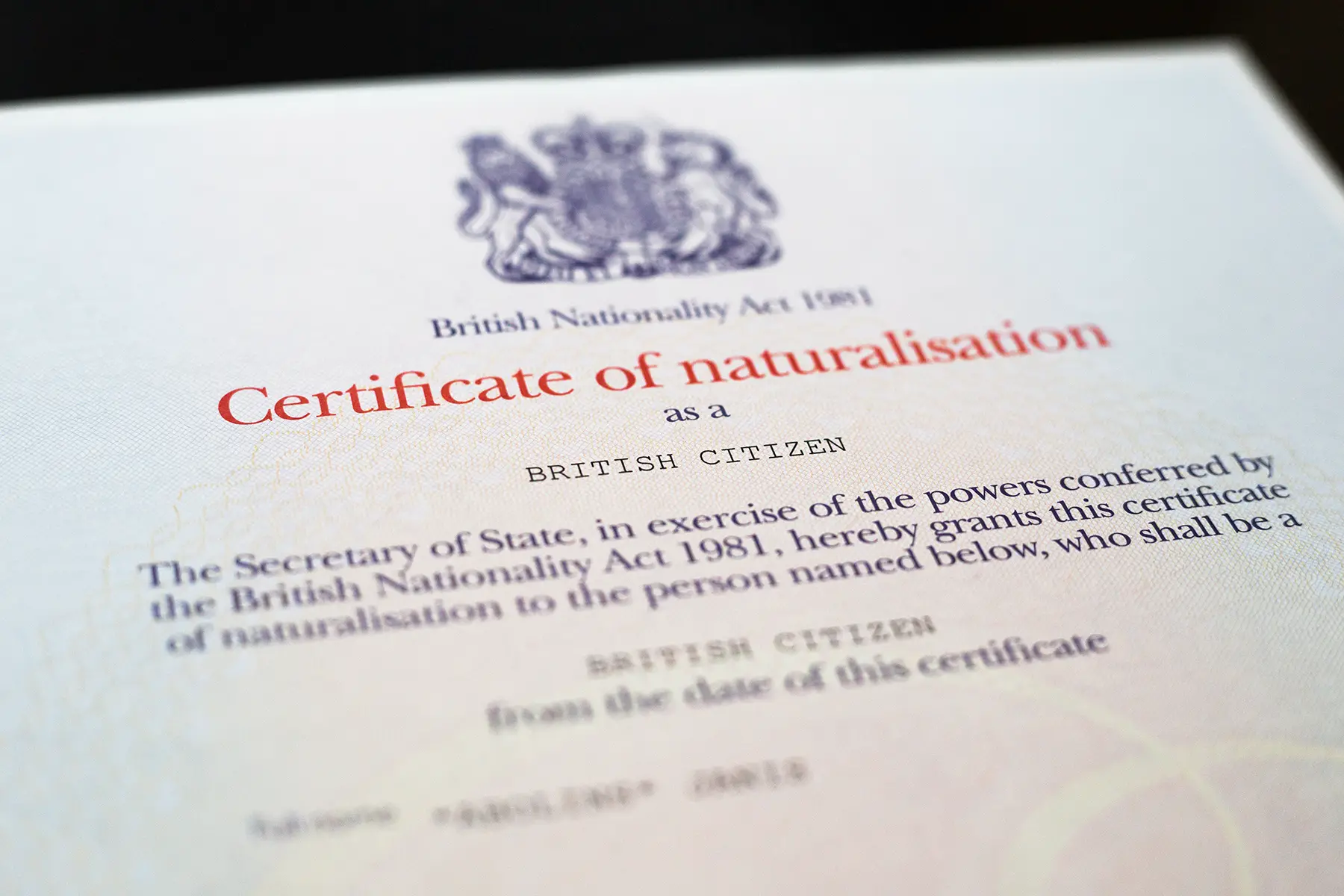If you are visiting or moving to the United Kingdom, it’s essential to check if you need a visa to enter the country, as well as what type of visa you need to apply for. This will depend on where you are traveling from and the purpose of your visit.
To help you apply with ease, read on to learn about the following topics:
- Immigration in the UK
- Who needs a visa to enter the UK?
- What types of UK visas are available?
- What is a Short-stay UK visa?
- What is a Non-Immigrant UK visa?
- What is a UK immigrant visa?
- Asylum-seekers and refugees in the UK
- Residence and citizenship in the UK
- How do you make an appeal or complaint?
- Useful resources
Sirelo
It's no secret that moving abroad can be stressful. Sirelo's team of removal advisers is here to help. They provide five free quotes from international shipping companies so you can find the best options at the best prices. Take the stress out of your relocation to the UK with Sirelo.
Immigration in the UK
The UK has always had a sizable migrant population, with many coming over the years to work, study, or join family members in the UK. However, 9% of UK residents were born overseas, a lower proportion than in many other European countries.
Over half of the UK’s international population originated from European Union (EU) countries. However, since freedom of movement between the EU and the UK ended in 2021, new arrivals in the country are mostly non-EU nationals. Most expats live in the more populated big cities, and a large proportion live in London.

Since the UK left the European Union on 31 December 2020. EU/EFTA citizens have been subject to the same visa requirements as third-country nationals.
However, those already living in the UK as of 31 December 2020 could apply for settled or pre-settled status in the UK through the EU Settlement Scheme. The deadline for this was 30 June 2021, although there are some exceptions for late applications.
The UK Home Office is the government department responsible for dealing with visas and immigration in the UK.
Who needs a visa to enter the UK?
Whether you need a UK visa depends on:
- What country you are traveling from
- How long you intend to stay
- The purpose of your visit
Residents of all overseas countries need a UK visa to stay for longer than six months, while nationals from over 100 countries worldwide need a visa to simply enter the UK. Those not included in this list of countries can stay up to six months. However, they are usually not permitted to take up employment.
Citizens of British Overseas Territories and citizens of Commonwealth countries born before 1 January 1983 who qualify for the right of abode (ROA) through a parent being born in the UK have the right to travel and live in the UK without a visa.
Several nationalities can enter the UK without a visa for short stays. However, starting in January 2025, most travelers require an electronic travel authorization (ETA). From March 2025, this also includes nationals of:
- EU countries (except Ireland)
- Andorra
- Iceland
- Liechtenstein
- Monaco
- Norway
- San Marino
- Switzerland
- Vatican City
An ETA costs £10 and allows a visa-free stay of up to six months for tourism, business, study, or medical treatment. Visit the UK Government website pages to find out which nationalities can get an ETA and how to apply. Irish citizens do not require an ETA.
Citizens of all other countries will require a visa to enter the UK. You can check the exact UK visa requirements for your home country on the UK Government website.
EU/EFTA citizens after Brexit
Since Brexit, the UK’s departure from the EU, EU/EFTA nationals no longer have freedom of movement to the UK. If you are from an EU/EFTA country, you can travel visa-free to the UK for up to six months with an ETA. However, you will need one of the relevant visas in the below sections if you want to stay for longer than six months.
EU/EFTA citizens living in the UK before 31 December 2020 could apply to the EU Settlement Scheme to obtain either settled or pre-settled status.
What types of UK visas are available?
UK visas can be broken down into three broad categories, which are:
- Short-stay UK visas
- Non-immigrant visas
- Immigrant visas
What is a Short-stay UK visa?
Short-stay are visas can be valid anywhere from 24 hours to six months and include tourist visas, visitor visas, and transit visas. Here are some of the Short-stay UK visas you can apply for:
Standard Visitor visa
The Standard Visitor visa allows you to travel to the UK for leisure, business, study, or private purposes and stay for up to six months. You can extend this to 11 months if you’re receiving private medical treatment or 12 months if you’re doing academic research.

This visa costs £100. In some cases, it’s possible to apply to extend this visa if you need to stay in the UK for longer. The cost for the extension varies between £200 and £1,000, depending on your reasons for extending your stay.
You can apply for this visa as long as you can prove that you can financially support yourself for the duration of your stay. You will also need to provide a current passport or valid ID. Additional documents may need to be provided, depending on the purpose of your visit.
The visa is also available as a long-term visitor visa, however, you will only be able to stay for a maximum period of six months at a time. You’ll also need to prove that you’re only visiting and not living in the UK on each visit. Costs for long-term visitor visas are:
| Duration of time (6 months per visit) | Cost |
| 11 months (medical visit) or 12 months (academic visit) | £200 |
| Two years | £432 |
| Five years | £771 |
| 10 years | £963 |
Short-term Study visa
A Short-term Study visa is for short-study language courses that last between 6–11 months. You can apply if you are studying an English language course.
Short-term Study visa requirements
The cost is £200 plus a £776 healthcare surcharge to use the National Health Service (NHS). You need to be able to show evidence that you’ve been accepted and paid for a UK course and prove that you can support yourself financially. You will also need to provide a valid passport/ID and accommodation details.
Marriage Visitor visa
You can apply for a Marriage Visitor visa if you want to get married or register a civil partnership in the UK, as long as you’re not planning to settle in the country afterward.
UK Marriage Visitor visa application
The visa is valid for up to six months and costs £115. You will need to provide:
- Valid passport/ID
- Proof that you can financially support yourself for your stay
- Proof of marriage plans in the UK (e.g., venue booking confirmation)
- Accommodation plans during your stay
Paid Engagements
For paid engagements, you’ll need a Standard Visitor visa. This applies to people who:
- have been invited to the UK by an organization or client based in the country for a pre-arranged event or other engagement
- are experts in their profession
- are over 18
Requirements for a UK Standard Visitor visa
The visa is valid for up to six months and costs £115. You will need to provide:
- Valid passport/ID
- Proof that you can support yourself financially during the stay
- Invitation from a UK-based organization/client OR proof that the work you will be doing relates to your skills and expertise
- Accommodation plans
Parent of a Child Student visa
You can apply for the Parent of a Child Student visa if you have a child aged 4–11 who is attending an independent fee-paying school in the UK. Only one parent may join their child, and you may not work while on this visa. The document is usually valid for six months but can be extended to 12 months and then renewed until your child reaches 12 years of age.
Applying for a Parent of a Child Student visa for the UK
The visa costs £637, with extensions costing £1,258. You must also pay a healthcare surcharge so that you can use the National Health Service (NHS) when you arrive in the UK. As for your child: they must be aged under 12 and hold a Child Student visa.
To obtain the Parent of a Child Student visa, you will need to provide:
- Your valid passport/ID
- Proof of your child’s visa
- Evidence that you can support yourself financially during your stay
- Evidence that you can maintain your main home outside the UK
Chinese tour group visa
You can come to the UK as part of a Chinese tour group of at least five people. The tour must be organized by an ADS-licensed Chinese tour operator and you’ll need to stay with the group for the duration of the trip.
This visa is valid for 30 days and you pay the fee through your travel operator.
UK Transit visa
The UK Transit visa enables you to pass through the UK if you’re changing flights or traveling through the UK on the way to another country.
There are two types of transit visas. These are:
- Direct Airside Transit visa: If you are changing flights and not passing through UK border control. This costs £35 and lasts for 24 hours.
- Visitor in Transit visa: If you’re passing through border control but on the way to another country. This costs £64 and lasts for 48 hours.
How do you apply for a Short-stay visa for the UK?
You can apply for Short-stay visas at the UK visa application center in your home country. You can also apply online through the UK Home Office Visas and Immigration Service website.
People traveling from certain countries will need to have a tuberculosis test if they are coming to the UK for more than six months.
The UK Visas and Immigration website has information on managing your visa application, containing information on things such as getting documents back and reporting a change in your circumstances.
What is a Non-Immigrant UK visa?
A Non-Immigrant UK visa is a longer-term temporary visa for purposes such as studying or working on a fixed-term temporary contract. This type of visa is for anyone staying in the UK for longer than six months.
The majority of longer-term UK visas are issued for periods of between one and five years, often with the possibility of extension. The various types of fixed-term visas are as follows:
Study visa
In addition to the Short-term Study visa, there are two student visas available in the UK:
These visas are available to anyone who has been offered a placement at a recognized UK place of study. General student visas are granted for the length of the study course. Child student visas are available for those aged 4–17. They can be for up to six years (or three years if the child is 16 or 17).
Applicants will need to provide a valid passport/ID plus proof that they can support themselves during their stay without recourse to public funds.

General student visa applicants will need to provide evidence that they meet English language requirements. Child student visa applicants will need to show evidence of consent from their parent or guardian.
The student visa costs £490 to apply from outside the UK or to extend or change to a student visa once you’re within the UK. On top of this, you must also pay healthcare surcharge costs.
For the Child Student visa, you will need £1,560 per month (for up to 9 months). This amount will cover both you and your accompanying parent.
Students on a general study visa can apply to be joined by certain family members if eligibility conditions are met.
Short-term work visas
There are several short-term UK work visas. These are:
- Charity Worker visa: For volunteer workers, valid for up to 12 months
- Creative Worker visa: For those working professionally in the arts, valid for up to 12 months
- Government Authorized Exchange visa: For those doing work experience, training, or research. The visa is valid for up to two years.
- International Agreement visa: For government workers and diplomats carrying out work abroad. Valid for up to two years.
- Religious Worker visa: For those working in a religious capacity, valid for up to two years.
- Seasonal Worker visa: For those employed to work on UK farms, valid for up to six months.
- Youth Mobility Scheme visa: For those aged 18–30 who meet certain financial and nationality requirements, valid for up to two years.
- Graduate visa: For those graduating in the UK staying for up to two years (or three years if a Ph.D. graduate) to look for work.
- Overseas Domestic Worker visa: For workers such as au pairs, cleaners, carers, and cooks working privately for families.
The costs for these visas vary from £298 to £822, so check the government pages when applying. You may also need to pay a healthcare surcharge to use the NHS.
Other UK work and business visas
Longer-term UK visas for work purposes include:
| Name of visa | Who it’s for | Length | Fee |
| Skilled Worker | Employees of approved employers with eligible jobs and salaries | Up to five years (renewable) | £719–1,639 |
| Senior or Specialist Worker | Workers in eligible positions transferring to their employer’s UK branch | Up to five years (renewable up to nine years) | £719–1636 |
| Health and Care Worker | Qualified medical and social care professionals | Up to five years (renewable) | £284 for up to three years, £551 for more than three years |
| Minister of Religion | Those working in faith communities | Up to three years (renewable up to six years) | £719 for initial application, £827 to extend or switch |
| International Sportsperson | Elite sportspeople and qualified coaches | Up to three years (renewable) | £298 for up to 12 months, £719 for longer than 12 months when applying outside the UK, £827 for longer than 12 months when applying or switching in the UK |
| Innovator Founder | People who want to set up an innovative business in the UK | Up to three years (renewable) | £1,191 when applying outside the UK, £1,486 when applying, extending, or switching your visa in the UK |
| Global Talent | Leaders and potential leaders in academia and research, arts and culture, or digital technology | Up to five years (renewable) | £716 (£524 to apply for an endorsement, £192 visa fee) |
| UK Ancestry | Commonwealth citizens whose grandparents were born in the UK, the Channel Islands, or the Isle of Man | Up to five years (renewable) | £637 |
| Representative of an Overseas Business | Employees of overseas media | Up to three years (renewable for another two years) | £719 to apply outside the UK, £827 to apply inside the UK |
| UK Expansion Worker | Senior managers or specialist employees of overseas businesses setting up a branch in the UK | Up to a year (renewable for two years) | £298 |
All of these visas except for the Health and Care Worker visa require applicants to pay a healthcare surcharge, usually £1,035 per year, to access the NHS.
Family visa
You can apply for a family visa in the UK if you want to come and live with your:
- Spouse/partner
- Fiancée or proposed civil partner
- Child
- Parent
- Relative who is providing you with long-term care
The cost of this visa is £1,846 (or £1,258 if you apply from within the UK). It costs £3,250 if you are an adult relative who requires care from a UK resident. There is also a healthcare surcharge of £1,940–£5175 depending on your age and how long you stay.
Family visas last for two and a half years if you apply as a partner/spouse or parent, although they can be extended. If you apply as a child or dependent relative, the visa can be for longer. The exact length will depend on your situation.
What is a UK immigrant visa?
Immigrant UK visas are available for those who want to stay in the UK long-term or permanently (a period longer than 5–10 years), usually for work or family reunion purposes. These visas can be repeatedly renewed if certain conditions are met.
You can apply for this visa after five years of continuous residence in the UK. There are various immigrant UK visas available, including the following:
Work and business visas
If you intend to relocate to the UK permanently or for a period longer than five years for work or business purposes, you will typically need to get a work visa and then extend it or apply for a settlement permit.
Visas that can be extended for five years and beyond include:
- Skilled Worker visa
- Senior or Specialist Worker visa
- Minister of Religion
- Innovator Founder visa
- Global Talent
- UK Ancestry visa
- Representative of Overseas Business visa
To stay beyond the maximum extension on your visa, you will either need to switch to another visa (if your current visa permits this) or apply for permanent residence if you meet the eligibility requirements for your visa.
Family visa
UK family visas last for two-and-a-half years for spouses/partners and parents, after which they can be extended. For children and cared-for relatives, they can be issued for longer periods.
As with work visas, those in the UK for family reunion purposes are eligible for permanent residence after five years of living in the UK. Children aged under 18 can sometimes apply for permanent residence earlier.
Retiring to the UK
The UK no longer has a visa purely for retirement. Those wanting to move to the UK for retirement need to apply using a visa for which they are eligible (e.g., work, investment, family) and then apply for permanent residence after five years.
Asylum-seekers and refugees in the UK
There were over 97,000 asylum applications in the UK in the 12 months before June 2024. This was fewer than the 2023 figures for EU countries such as Germany, France, Spain, and Italy. The UK granted asylum or humanitarian protection to 58% of applicants in this time.
Application claims are processed by the UK Home Office. You can make an asylum claim at the border control of any UK airport or an asylum intake unit if you want to apply from within the UK. It is not possible to apply for UK asylum from outside the country.

Once you have made your application, you will have an appointment with an immigration screening officer. You will need to provide a passport or any current ID you have to file an asylum application, along with any information or supporting evidence.
You’ll be given an asylum registration card while you wait for your application to be processed. This takes up to six months. During this time, you won’t be able to work but will be able to access health services in the UK and the British education system for any children aged under 18.
What support do asylum-seekers and refugees get in the UK?
The current benefit for asylum-seekers in the UK is £49.18 a week per person. This can be increased by up to £9.50 a week if you have a baby under one year old, or £5.25 a week if you are expecting or you have a child aged 1–3 years.
Asylum-seekers are housed in temporary accommodation – usually a flat, house, hostel, or bed and breakfast. Housing and financial support are available using the ASF1 form.
Successful applicants will be given leave to remain in the UK for five years as refugees, after which time you can apply for an extension if the circumstances regarding returning to their home country remain similar. Alternatively, you can apply for a UK settlement permit if you are eligible. This is free of charge if you are a refugee.
Rejected asylum-seekers will be required to leave the UK within a specified time, although they can appeal the verdict.
Support for asylum-seekers and refugees is available through several charities in the UK, such as the Refugee Council.
What visas are available for Ukrainian nationals and family members?
The Ukraine Family Scheme visa closed in 2024, but Ukrainian nationals fleeing the country following the Russian invasion can apply for the Homes for Ukraine Sponsorship Scheme visa. This is a three-year visa for Ukrainian nationals that have a named sponsor who can accommodate them
Both of these visas are free and entitle the holder to work, study and access public funds in the UK. Check the UK government website for support with visa applications and information on what to do when coming to the UK.
Residence and citizenship in the UK
Those who want to stay in the UK for longer than six months need to apply for a UK biometric residence permit (BRP). This is an identity card that contains the following information:
- Name, date, and place of birth
- Fingerprints and photograph
- Immigration status and any conditions of your stay
- Your social rights (e.g., access to public funds, social services)
If you are working, studying, or have other special reasons for remaining in the UK, you are likely to be eligible for a BRP if you can provide the necessary evidence of your situation.
You can apply for a BRP from the following outlets if you are making your application from inside the UK:
- UK Visa and Citizenship Application Services (UKVCAS)
- Visa and Immigration Service and Support Center
- Any UK post office
Applications from outside the UK need to be made from a visa application center.
The BRP is valid for the duration of your stay in the UK, up to a maximum of 10 years. It costs £56 if you apply within the UK.

After five years of continuous residence in the UK, you can apply for permanent residence if you meet other requirements related to your specific visa.
You can also apply for UK citizenship if you either:
- Are married to/in a civil partnership with a British citizen and have lived in the UK for three years
- Have indefinite leave to remain and have lived in the UK for at least 12 months
- Qualify for British nationality via another path
You will also need to meet other requirements, such as demonstrating English language skills and passing the Life in the UK test.
How do you make an appeal or complaint?
You can ask for an administrative review after a visa rejection. You should do this within 28 days of receiving the decision. This will cost £80.
If you’re not happy with the outcome of this, you may be able to appeal to the First-tier Tribunal. The tribunal also deals with appeals relating to asylum applications, British citizenship, and the EU Settlement Scheme.
You can escalate the complaint to the Upper Tribunal if you believe there has been a legal mistake.
However, appealing a visa decision can be a costly and lengthy exercise. Because of this, it’s wise to get legal advice before proceeding. Citizens Advice can provide you with support and signpost you to the right legal services.
Useful resources
- UK Home Office Department of Visas and Immigration – inventory of the different types of UK visas
- UK visa search – find out which visa you need to enter the UK
- Biometric Residence Permit (BRP) – more information on getting a resident permit in the UK
- Find a visa application center – locate the closest visa application center to you











